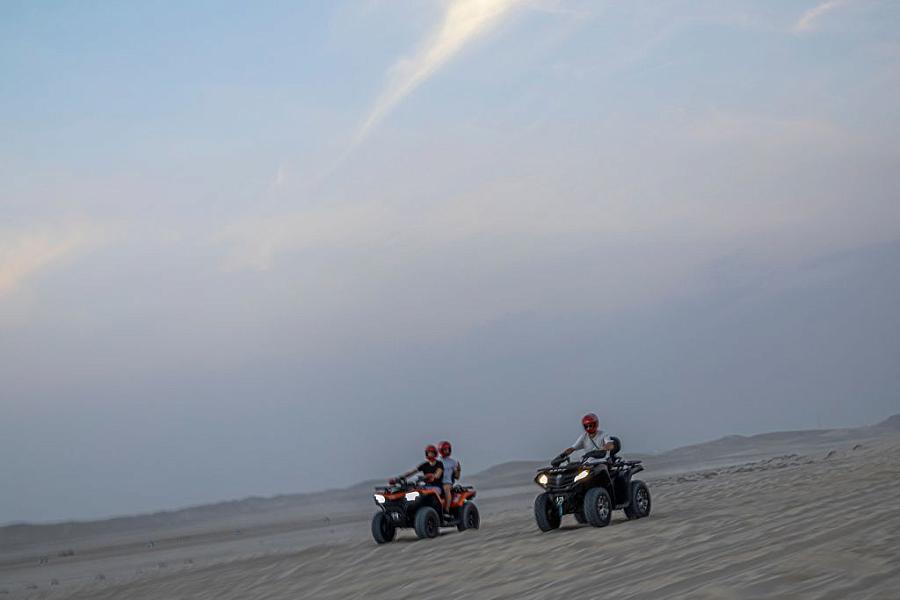Hearing the lived experiences of two women transformed my reporting on poor air quality

Dust from sand dunes, often kicked up by off-road vehicles, at Oceano Dunes in Central California contributes to poor air quality in the region.
(Photo by Khaled Desouki/AFP via Getty Images)
Air quality on the Nipomo Mesa on the Central California coast is bad and has been for a while. That data is available. In my reporting on the public health issues that surround that fact, I set out to look at the ways in which people of color and low-income folks are more adversely affected, and how barriers to medical care exacerbate that problem.
I met Maria and Soledad on a park bench in Oceano back in July of 2022. I was a month away from finishing my project and they were the first people I met who were actually dealing with the health impacts I had been covering. The two are immigrants to California. Soledad works outside picking fruit and she breathes in the air on the Mesa every day.
It was one of the most challenging and informing conversations I have ever had. A language barrier between us meant Maria’s daughter had to help translate. We spent an hour in that park going back and forth trying to understand each other. And by the time I left, I had a different understanding of the story I was trying to tell.
The information I got from public officials, health care organizations and data sets was valuable. But it wasn’t personal testimony from an individual who was living the experience we were all talking about. Maria and Soledad shifted my perspective about the health issues they continue to face, which informed how I told the story.
For me, this fellowship and my reporting for it highlighted the importance of telling stories for communities rather than about them. That was the biggest lesson I learned.
But it wasn’t the only one. Here are some of the big lessons I learned throughout these several months of reporting. Hopefully, other early-career journalists find them useful as they take the plunge into their own ambitious reporting projects.
1. Balancing work and your long-term project might be difficult. That’s ok.
One of the biggest challenges I faced as a fellow was simply finding time to focus on the project outside of my daily work requirements. For much of the time I was reporting for the California Fellowship, I was also the only reporter at our station. That meant, writing, producing and airing a local story every day. Many days, I just couldn’t put energy or time toward my fellowship project. That often felt defeating, like I was falling behind. But leaning into that challenge as part of the experience was valuable. Finding little opportunities here and there to chug away at my project became noteworthy. When I finally let go of the stress and accepted that I wouldn’t be able to dedicate all of my energy to this project all the time, I actually made good progress.
2. Be diligent and keep following up.
There were times when no matter how hard I tried to make progress, I felt like I was getting nowhere. I would go days with no replies, no calls back, no new information. I sometimes felt like I’d reached a dead end, only to be graced with a response or stumble upon something helpful. Leaning into the persistence we all learn to have as journalists was key in a long-form project. Some people didn’t get back to me until the 10th phone call — but they did get back to me. I figured out new ways to contact sources and develop trust with them. I learned that talking to fellow reporters and mentors is helpful for looking at something from another perspective and moving forward in the project instead of feeling stuck. Just keep trying and something will eventually materialize.
3. Be open to shifting your project’s focus or adjusting coverage.
My original goal was to shine a light on a disproportionately impacted community while highlighting the ways local leaders are creating solutions. And I did that. But after leaving my conversation with Maria and Soledad, I knew I had to add to that goal. Their stories helped my reporting expand beyond just what I had been told the problem was. The two women helped me include their unique experiences and share things they want to see changed. Instead of letting my reporting serve as my own confirmation bias, I made additions, asked more questions and altered the coverage to tell a broader story. I also learned this lesson from the other fellows in my group. Many of us went into the project with a firm idea about what we would cover. But when things didn’t materialize how we expected, we helped each other shift focus or look at things from a different angle.
Ultimately this reporting project was a challenge and a lesson in growth. I’m proud of the accomplishment and the experience. I learned more than I expected, and hopefully did some work to improve the health of the Nipomo Mesa community by sharing the lived experiences of people in the area.
